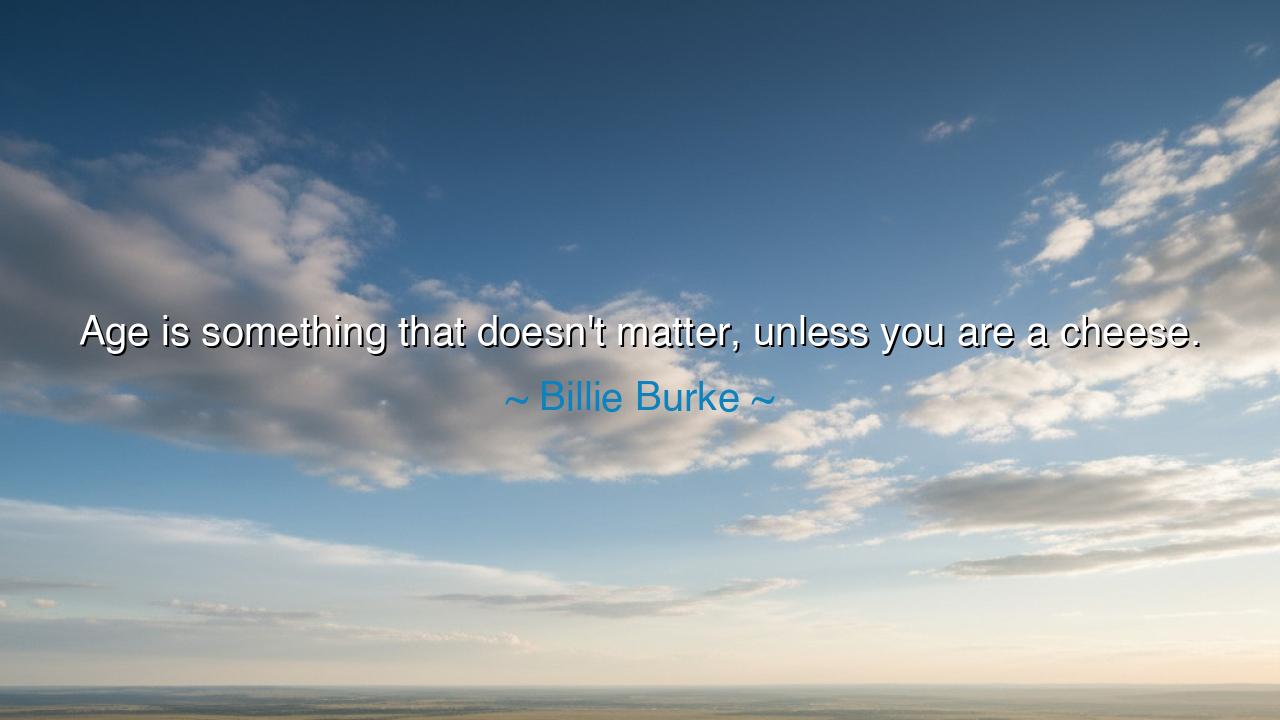
Age is something that doesn't matter, unless you are a cheese.






In the grand tapestry of life, the concept of age is often a source of both reflection and concern. The natural process of growing older—of years stacking up like the rings of a tree—can fill the heart with both wisdom and apprehension. Yet, in her playful and insightful remark, Billie Burke delivers a profound truth: "Age is something that doesn't matter, unless you are a cheese." These words are filled with humor, but they also carry a deeper wisdom about the nature of time and value. For Burke, age is a measure not of worth, but of perspective. It is the spirit, not the number of years, that determines the richness and beauty of life. Only in the case of cheese, where time can enhance the flavor, does age truly matter. For humans, however, the essence of life is not bound by age but by the mind and the soul that remain ever young.
The ancients too had their thoughts on age, often reflecting on its impermanence and its relationship with wisdom. The Greek philosophers, particularly Socrates, viewed age as a natural, inevitable progression, but they understood that it was not the years that made one wise or virtuous, but the choices made along the way. Socrates famously said, “True wisdom comes to each of us when we realize how little we understand about life, ourselves, and the world around us.” In this sense, age was not to be feared or revered in itself, but understood as a passage that, when filled with self-examination and growth, could lead to greater insight and understanding. The Socratic view mirrors Burke’s sentiment—that age, in and of itself, is not a measure of a person's value or vitality, but rather the way in which a person engages with life.
Look at the legendary figures from the annals of history who defied the expected limitations of age. Michelangelo, who sculpted the magnificent David in his youth, continued to create stunning works of art well into his 80s. Despite the advancing years and the limitations that come with them, Michelangelo refused to be weighed down by the physical signs of aging. His mind and soul remained as vibrant as ever, refusing to let the number of years define his capacity to create. In this, he embodied the idea that age is but a number, and it is the spirit that fuels the creativity and brilliance of an individual. His life reminds us that the value of a person is not measured by the number of years, but by the work they produce, the impact they make, and the passion they continue to bring to the world.
Burke’s quote also reminds us that, in the natural world, there are things for which age does indeed have a significant role—like cheese. The ripening process, which can transform the simple into the sublime, is a metaphor for the way in which time can enhance certain qualities in life. Like fine cheese, age can, in some contexts, add richness, depth, and wisdom to our experience. But this does not mean we must become resigned to the idea that time will inevitably reduce us to something less vibrant or valuable. Just as cheese matures into something extraordinary, so too can our minds and hearts continue to grow in depth and wisdom with age—if we allow them to. The secret is not to fear the passage of years, but to embrace them as an opportunity to deepen and expand our human experience.
The lesson Burke offers is profound in its simplicity: age matters only in those cases where time enhances, such as with cheese, but for humans, it is the spirit, the curiosity, the joy of life that truly matters. The Greeks understood this when they taught that the soul does not age as the body does, and it is the soul that must be nourished through wisdom, self-reflection, and meaningful action. Socrates did not grow weary of questioning life as he aged, nor did he let the years define his ability to engage in deep thought. Like Michelangelo, we are all capable of creating, learning, and thriving regardless of our age—if we choose to keep our spirits young, our hearts open, and our minds engaged.
Thus, the practical action we must take in our own lives is to free ourselves from the constraints of age and to focus on the vitality that comes from an active spirit. Let us not fear age or decline, but let us choose to live with the curiosity of youth and the wisdom of the years. Let us reject the idea that our value is tied to the number of years we have lived, and instead find meaning in how we live each day, how we continue to grow, and how we embrace the changing seasons of life. Age, after all, is only a measure of time; it is the heart and the mind that hold the real power to create beauty, make a difference, and live a fulfilling life.
Therefore, as we journey through life, let us hold the words of Billie Burke close: age is not the defining force of our existence unless we let it be. In each of us lies the power to remain vibrant, to be a living testament that age is but a passing season, and that our true worth lies in how we engage with the world, not in the number of years that separate us from the day we first arrived. Like fine wine or aged cheese, let us mature gracefully, with wisdom, love, and purpose—refusing to be defined by the years, but rather by the life we live in each and every moment.






AAdministratorAdministrator
Welcome, honored guests. Please leave a comment, we will respond soon